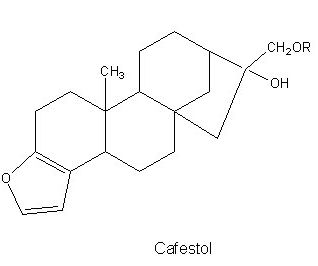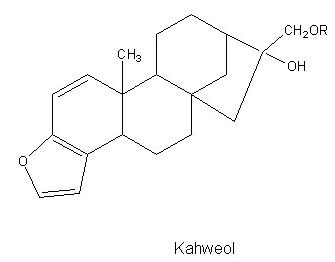|
|||||
|
|||||||
|
    An initiative of :Stichting Food-Info
|
| Food-Info.net> Products > Coffee Kahweol and CafestolIt has been known since the late 1980s that consumption of unfiltered coffee types raises serum cholesterol levels in humans. The components in coffee responsible for this effect are cafestol and kahweol. Cafestol and kahweol are fat-soluble compounds known as diterpenes, which are present in the oil derived from coffee beans. The only difference between cafestol and kahweol is an extra double bond present in kahweol. See images below.   The concentration of these two compounds depend on the type of coffee; arabica beans contain both cafestol and kahweol, whereas robusta beans contain half as much cafestol and hardly any kahweol. In arabica beans they may be present in up to 1% of the total volume of the beans. Cafestol raises serum cholesterol more potently than kahweol does. A mixture of cafestol (60 mg/day) and kahweol (51 mg/day) increased serum cholesterol only slightly more than pure cafestol (64 mg/day) did. Results with pure kahweol are not available due to difficulties with purification and stability of this diterpene. Both compounds are extracted by hot water but are retained by a paper filter. This explains why Scandinavian boiled coffee, Turkish coffee and French press (cafetière) coffee contain relatively high levels of cafestol and kahweol (6-12 mg/cup), while filtered coffee, percolated coffee and instant coffee contain low levels of cafestol and kahweol (0.2-0.6 mg/cup). Although diterpene concentrations are relatively high in espresso coffee, the small serving size makes it an intermediate source of cafestol and kahweol (4 mg/cup). Both kahweol and cafestol also have an effect on a series of enzymes in the liver. The mechanism(s) and the effects on human health are not yet fully understood. It has also been claimed that both diterpenes have anti-carcinogenic effects. Epidemiological studies have found an inverse association between coffee consumption and the risk of certain types of cancers such as colorectal cancers. Animal data support such a preventive effect of coffee. Both kahweol and cafestol were shown to produce a broad range of biochemical effects resulting in a reduction of the effect of several carcinogens including PAHs (polycyclic aromatic hydrocarbons, a class of chemicals produced by burning organic material), aflatoxin B1 (a mycotoxin) and others. Different mechanisms appear to be involved in these protective effects, but the mechanism has not been elucidated. Sources :
|
|
| ||
| Food-Info.net is an initiative of Stichting Food-Info, The Netherlands | ||||||